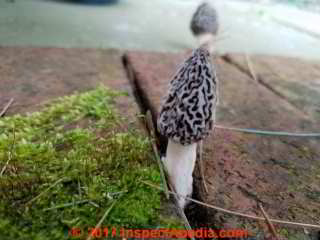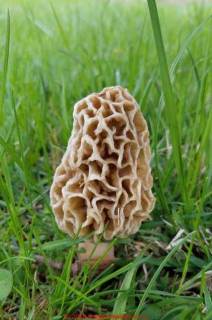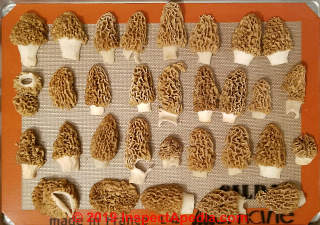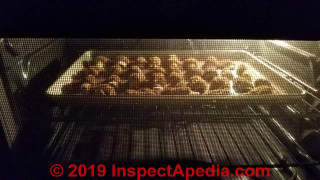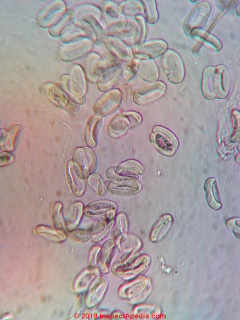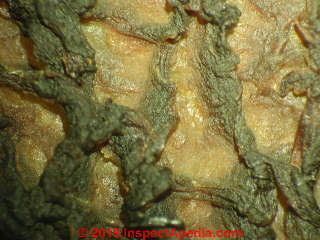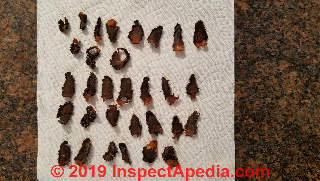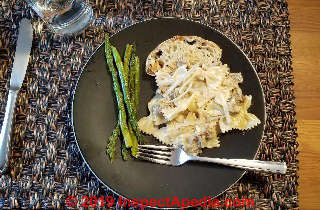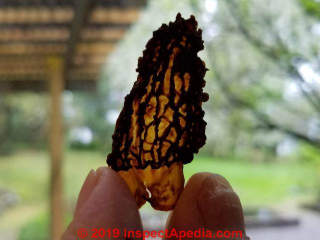 Morel Mushrooms
Morel Mushrooms
Identification, eating, or drying for future use
- POST a QUESTION or COMMENT about how to determine how old mold growth is in buildings
Identification photos of true morels, Morchella esculenta and notes on look-alikes that are not good to eat.
This article series discusses how we can estimate the age and history of fungal growth and mold contamination in or around a building and how we can find evidence suggesting that a given mold contamination case is new, old, or includes both old and new fungal growth.
Photo at page top: a fresh morel, sliced in half, dried, and ready for storage for future use.
InspectAPedia tolerates no conflicts of interest. We have no relationship with advertisers, products, or services discussed at this website.
- Daniel Friedman, Publisher/Editor/Author - See WHO ARE WE?
Morel Mushrooms - example of "overnight" appearance of fruiting bodies of some mushrooms
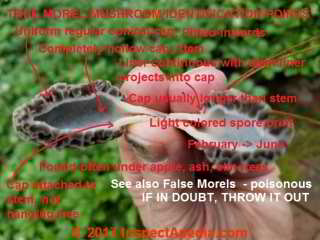 Identification of True Morel mushrooms is pretty easy but even so, a dark gray morel like the one shown in my photo above is not good eating. Below we illustrate the yellow morel Morchella esculenta variety that is delicious and highly-sought-after.
Identification of True Morel mushrooms is pretty easy but even so, a dark gray morel like the one shown in my photo above is not good eating. Below we illustrate the yellow morel Morchella esculenta variety that is delicious and highly-sought-after.
Watch out: when in doubt, throw it out. Eating a bad mushroom can be sickening or even fatal.
[Click to enlarge any image]
We discuss Morels as an example of mushrooms that can appear (outdoors) practically overnight in the right weather conditions, site conditions, and time of year.
These edible fungi were used as an example to illustrate how quickly various fungi can produce fruiting bodies including molds that grow in or on building materials and indoors.
Watch out: finding growing mushrooms indoors is an indication of a serious history of leaks and water damage or flooding - the building may contain hidden and harmful mold reservoirs.
The morel mushroom shown in our photo above appeared just about overnight, sprouting up in a brick entry walkway - these dark gray morels, probably not the yellow Morchella esculenta variety shown below, were, however not good to eat - growing in pine-needle-covered soil their taste was horrible.
In contrast, the more-typically-coloured light beige morels, Morchella esculenta, shown below, were quite edible.
Below: the fruiting body of a true morel, accompanied by a microphotograph of Morel mushroom fungal spores.
Watch out: people have been seriously poisoned, even died, from eating improperly-identified or improperly-selected mushrooms. When in doubt, throw it out, don't eat it.
Watch out also: even edible mushrooms may vary widely in taste and appeal, not just by genera/species but by the mushroom's growing conditions and the make-up of its soil. I would not eat a mushroom that has been found on chemically-treated ground (which includes soil under some apple trees) or close to a public roadway where salt or other treatments have entered the soil.
Oven Drying for Edible True Morel Mushrooms to Store for Future Use
Photo: Morchella esculenta being prepared by the author [DF] for drying for future use. [Click to enlarge any image]
To dry these morels in order to store them for future use we took the following steps
- Harvest fresh morels before they turn dark brown
- Gently brush off dirt and debris, shake off additional debris or small insects. I use an artist's brush to brush debris from the stems.
- Trim off very dirty raggedy stem ends
- Slice the morel in half lengthwise.
Watch out: if the morel is NOT HOLLOW inside, STOP and throw your false morels away. True morels are hollow inside as shown in other photos in this article series. - Pre-heat the oven to 150°F
- Place the morel halves on a non-stick surface baking pan - I use a silicone baking sheet to avoid any oil on the mushrooms
- Bake for about 40 minutes and check the condition of the morels - if they're drying nicely but not quite dried out flip them over
- Bake for another 20-40 minutes, inspecting carefully to be sure you're not burning the mushrooms
Below: our morels are drying out during their trip to what we told them would simply be a "little trip to the spa".
If your morels object to going into the oven at 150°F you should put them in there anyway. You can try reading to them:
The time has come,' the Walrus said,
To talk of many things:
Of shoes — and ships — and sealing-wax —
Of cabbages — and kings —
And why the sea is boiling hot —
And whether pigs have wings.'
But wait a bit,' the Oysters cried,
Before we have our chat;
For some of us are out of breath,
And all of us are fat!'
No hurry!' said the Carpenter.
They thanked him much for that. - Lewis Carroll, The Walrus and the Carpenter
Don't be surprised later to see yellow powder all over your baking pan as the sponge mushrooms (true morels) dry out. The dry-out conditions tell the morels, actually the fruiting body of Morchella esculenta, that it's time to release their spores. Millions of spores are released as the mushrooms dry. In the oven the spores appear as a yellow dust.
The spores of Morchella esculenta are hyaline when viewed under the microscope, but when being dried these morels will spew a stunning coating of yellow dust - their spores - over nearby surfaces.
Outdoors those same spores would have improved future Morel mushroom crops in the area where they land.
Under the stereo microscope the dried morel looks like this:
Below was our result, ready for bagging and storage.
To avoid the risk of mold growth on my dried mushrooms I like to put their dried little bodies into a clean zip-type freezer bag and store them in the freezer.
Research on Edible True Morel Mushrooms, Morel Recipes, & Poisonous False Morel Mushrooms
- Braun, R., U. Greeff, and K. J. Netter. "Liver injury by the morel poison gyromitrin." Toxicology 12, no. 2 (1979): 155-163.
- Brodeur, Mimi. Mushroom Cookbook: Recipes for White & Exotic Varieties. Stackpole Books, 2005.
includes a nice creamy morel mushroom sauce recipe as do other sources. - Hendricks, H. V. "Poisoning By False Morel (Gyromitra Esculenta): Report Of A Fatal Case" Journal of the American Medical Association 114, no. 17 (1940): 1625-1625.
- Kuo, Michael. 100 edible mushrooms. The University of Michigan Press, 2007.
- Litchfield, J. H. "Morel mushroom mycelium as a food‐flavoring material." Biotechnology and Bioengineering 9, no. 3 (1967): 289-304.
- McKnight, Kent H., Roger Tory Peterson, and Vera B. McKnight. A field guide to mushrooms: North America. Vol. 34. Houghton Mifflin Harcourt, 1998.
- Michelot, Didier, and Bela Toth. "Poisoning by Gyromitra esculenta–a review." Journal of applied toxicology 11, no. 4 (1991): 235-243.
- Molina, Randy, Thomas O'Dell, Daniel Luoma, Michael Amaranthus, Michael Castellano, and Kenelm Russell. "Biology, ecology, and social aspects of wild edible mushrooms in the forests of the Pacific Northwest: a preface to managing commercial harvest." (1993).
- Nitha, B., C. R. Meera, and K. K. Janardhanan. "Anti-inflammatory and antitumour activities of cultured mycelium of morel mushroom, Morchella esculenta." Current Science (00113891) 92, no. 2 (2007).
- Smith, Alexander Hanchett, and Nancy S. Weber. The mushroom hunter's field guide. University of Michigan Press, 1980.
Above: Dried Morchella esculenta - aka "sponge mushrooms" aka Morel mushrooms, yellow variety, are highly-sought-after and can sell for $10. to $60. U.S. per ounce.
That higher number is a price quoted by Walmart's online store on 2019/04/30 for one ounce of dried morel mushrooms packaged by OliveNation, harvested either in the U.S. or India.
...
Continue reading at MOLD AGE, HOW OLD is the MOLD? or select a topic from the closely-related articles below, or see the complete ARTICLE INDEX.
Or see these
Recommended Articles
- MOLD AGE, HOW OLD is the MOLD?
- MOLD GROWTH ON SURFACES, PHOTOS
- MOLD GROWTH on SURFACES
- MOLD HYPHAL FRAGMENTS
Suggested citation for this web page
MOREL MUSHROOMS, IDENTIFICATION & DRYING at InspectApedia.com - online encyclopedia of building & environmental inspection, testing, diagnosis, repair, & problem prevention advice.
Or see this
INDEX to RELATED ARTICLES: ARTICLE INDEX to MOLD CONTAMINATION & REMEDIATION
Or use the SEARCH BOX found below to Ask a Question or Search InspectApedia
Ask a Question or Search InspectApedia
Try the search box just below, or if you prefer, post a question or comment in the Comments box below and we will respond promptly.
Search the InspectApedia website
Note: appearance of your Comment below may be delayed: if your comment contains an image, photograph, web link, or text that looks to the software as if it might be a web link, your posting will appear after it has been approved by a moderator. Apologies for the delay.
Only one image can be added per comment but you can post as many comments, and therefore images, as you like.
You will not receive a notification when a response to your question has been posted.
Please bookmark this page to make it easy for you to check back for our response.
IF above you see "Comment Form is loading comments..." then COMMENT BOX - countable.ca / bawkbox.com IS NOT WORKING.
In any case you are welcome to send an email directly to us at InspectApedia.com at editor@inspectApedia.com
We'll reply to you directly. Please help us help you by noting, in your email, the URL of the InspectApedia page where you wanted to comment.
Citations & References
In addition to any citations in the article above, a full list is available on request.
- Viitanen, Hannu, Juha Vinha, Kati Salminen, Tuomo Ojanen, Ruut Peuhkuri, Leena Paajanen, and Kimmo Lähdesmäki. "Moisture and bio-deterioration risk of building materials and structures." Journal of Building Physics 33, no. 3 (2010): 201-224.
- Fifth Kingdom, Bryce Kendrick, ISBN13: 9781585100224, - we recommend the CD-ROM version of this book. This 3rd/edition is a compact but comprehensive encyclopedia of all things mycological. Every aspect of the fungi, from aflatoxin to zppspores, with an accessible blend of verve and wit. The 24 chapters are filled with up-to-date information of classification, yeast, lichens, spore dispersal, allergies, ecology, genetics, plant pathology, predatory fungi, biological control, mutualistic symbioses with animals and plants, fungi as food, food spoilage and mycotoxins.
- In addition to citations & references found in this article, see the research citations given at the end of the related articles found at our suggested
CONTINUE READING or RECOMMENDED ARTICLES.
- Carson, Dunlop & Associates Ltd., 120 Carlton Street Suite 407, Toronto ON M5A 4K2. Tel: (416) 964-9415 1-800-268-7070 Email: info@carsondunlop.com. Alan Carson is a past president of ASHI, the American Society of Home Inspectors.
Thanks to Alan Carson and Bob Dunlop, for permission for InspectAPedia to use text excerpts from The HOME REFERENCE BOOK - the Encyclopedia of Homes and to use illustrations from The ILLUSTRATED HOME .
Carson Dunlop Associates provides extensive home inspection education and report writing material. In gratitude we provide links to tsome Carson Dunlop Associates products and services.


